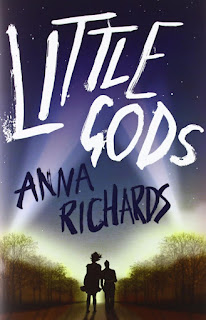Little Gods - Anna Richards
Little Gods relates the story of Jean, a lumpen monstrosity of a child who finds a way to survive in the world, despite an upbringing of abuse and deprivation from a bitter mother who had fought every step of the way to prevent her even coming into the world. Failing that, her treatment of Jean ensures that she never mistakes herself as being of any worth, or gets any ideas that she is in any way human and worthy of the romantic interest of a man. At school, in between the bouts of additional abuse meted out by her schoolteacher Jean however finds a friend in the glamorous Gloria, a young girl with romantic ideals. Forming a team to the mutual advantage of surviving their childhood, the direction their lives take diverge with the onset of the Second World War and the havoc it brings to everyone in their little seaside town.
There is much incident, marvel and wonder to follow as the hulking Jean finds friendship and a romance that seem more than she believes is her due, but are nonetheless unable to fill the huge void in her life. When she becomes a GI war-bride and attempts to start life anew, America opens up opportunities to fill that void through housework, Hollywood, religion and consumerism, but each carry their own set of dangers that Jean will find difficult to resist, and ultimately fail to bring her the one thing she needs; to be reconciled to herself.
The writing here, particularly the first half of the novel, is simply entrancing - delightfully phrased, poetically observant, not merely decorative, but getting to the heart of things, the workings of the world and the human soul within it. And if the second half of Little Gods doesn't quite live up to the magic created in the first part, sacrificing the freshness, inventiveness, daring and sheer wonder of Jean's uncommon childhood for advancing the storyline, there are no flaws in the characterisation, both halves complementing each other perfectly and remaining true to the themes.




Comments
Post a Comment